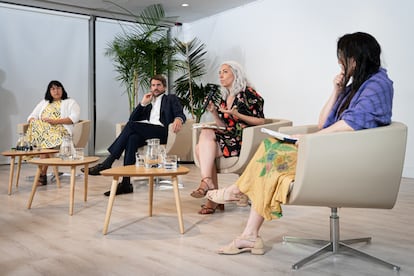The Ministry of Culture announced this Thursday the launch of the Cultural Rights Plan, a “priority” line of work of the portfolio that seeks “equality and equity in access to culture,” as stated by Jazmín Beirak, head of the Cultural Rights Directorate, The body was created last February. “We know that not all the population can access it in the same way, due to territorial, ethnic, racial, origin or disability gaps.” The project started this month with the diagnostic phase, in which nearly 200 representatives of associations, organizations and agents of the sector are participating. This first step will extend until November and the complete plan is expected to be presented in May 2025.
“For us, the plan is essential to open a window to the living cultures of our country, to establish the guidelines for the participation of our citizens in Spanish cultural life, which cannot be a closed menu created by institutions. It will give us a leading position in European cultural policies,” said the Minister of Culture, Ernest Urtasun, at a presentation event where he did not accept questions from the press. He added that the project will arbitrate policies that guarantee the right to culture, will redistribute access to it throughout the State and will value the diversity of practices at the level of language, traditions or heritage.
In this first stage of gathering proposals and identifying problems, members of associations, groups and entities from all over the country are participating. The members are divided between 15 and 20 for each of the 13 axes that make up the plan: local and community development; education and culture; cultural mediation; gender equality; ethnic-racial diversity; linguistic diversity; disability; inequality; intergenerational culture; sustainability; digital rights; evaluation of cultural policies; and regulatory adaptation, good practices and governance.
“When we arrived at the Ministry we were clear about three things: we did not want to direct the culture of our country from an ivory tower. Secondly, Spain has international commitments that recognise the right to culture as fundamental and we have the obligation to respond to this from the institutions. Thirdly, we are very clear that at this time the defence of culture is the main tool we have to defend democracy in times that are not easy for culture,” said Urtasun. She made reference to article 27 of the Declaration of Human Rights of 1948 and the Convention on the Protection and Promotion of the Diversity of Cultural Expressions of UNESCO, held in 2005.
Freedom of expression and the fight against censorship are other pillars that support the plan. It will be studied case by case and where conditions exist that favour control or censorship will be identified. Together with Urtasun and Beirak, the team that is preparing the project is made up of Beatriz Barreiro, a professor of Public International Law at the Rey Juan Carlos University; and Dagmary Olivar, a researcher and cultural manager.
Once the diagnosis is completed, proposals will be formulated, drafted and revised, with the final text expected to be presented next year. The Cultural Rights Plan will also be presented at the international cultural forum Mondiacult 2025, promoted by UNESCO, which will be held in Barcelona at the end of next year.

